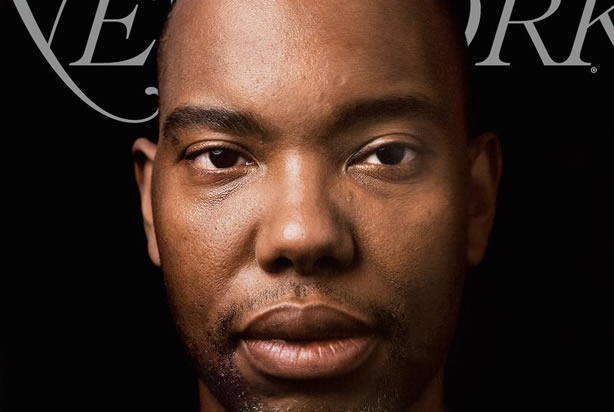In New York Magazine’s profile of Ta-Nehisi Coates — timed to coincide with the publication of his new book, “Between the World and Me” — the Atlantic writer spoke at length about his sudden, though demonstrably deserved, rise to national prominence as a uncompromising chronicler of the black experience in America.
Benjamin Wallace-Wells met with Coates in the days after Dylann Roof shot and killed nine parishioners in a Charleston, South Carolina church, and together they watched President Barack Obama eulogize Reverend Clementa Pinckney. “There’s a sister over here to the left, she’s natural, no perm, and a very black dude, and then an African-American president,” Coates said, before wondering what that would mean to a 4-year-old white child. “That’s the world as he knows it. So all these people saying that symbols don’t mean anything — that’s bullshit. They mean a lot.”
Coates is seen by many as the intellectual heir to James Baldwin. Toni Morrison wrote of “Between the World and Me” that “I’ve been wondering who might fill the intellectual void that plagued me after James Baldwin died” and “cleary, it is Ta-Nehisi Coates.” The comparison is apt, as Coates recounted reading Baldwin’s “The Fire Next Time” as he prepared to meet the president for the second time.
He recalled being stunned by how elegantly Obama was handling the room full of white reporters. “The race aspect is not gone from this,” he said. “To see a black dude in a room of the smartest white people and just be the smartest dude in the room — it just puts into context all the stuff about ‘Let me see his grades.'” At the end of that meeting, Coates recalled, the president even pulled him aside and told him that a blog post he had written criticizing him had been unfair.
That Obama would consider a blog post by Coates worthy of responding is less strange to Coates than the idea that white people engage with his work. “When people who are not black are interested in what I do, frankly, I’m always surprised,” he said. “I don’t know if it’s my low expectations for white people or what.”
Those expectations have become even lowered in light of recent events. “I have become radicalized,” Coates told Wallace-Wells, both by the high profile police killings of the past year and the response to them. The American dream as instantiated in the words of Martin Luther King, Jr. or the title of Obama’s memoir, “Dreams From My Father,” is nothing more than white America’s “reveling in a specious hope…that what your ancestors did doesn’t matter. That you went out to the suburbs, and the houses grew from nothing and it’s not contaminated by anything. The idea that you’re entitled to it, and people who don’t have it are either pathological or lower than you. That nothing’s wrong.”
“That’s the thing that linked Martin Luther King and Malcolm X,” Coates added. “People say Malcolm was a pessimist. He was a pessimist about America. But he was actually very optimistic. Malcolm very much believed in the dream of nationalism. He believed we could do it. And Martin believed in the dream of integration. He believed that black people could be successful if they did x, y, and z. I suspect they were both wrong. I suspect that it’s not up to us.”

